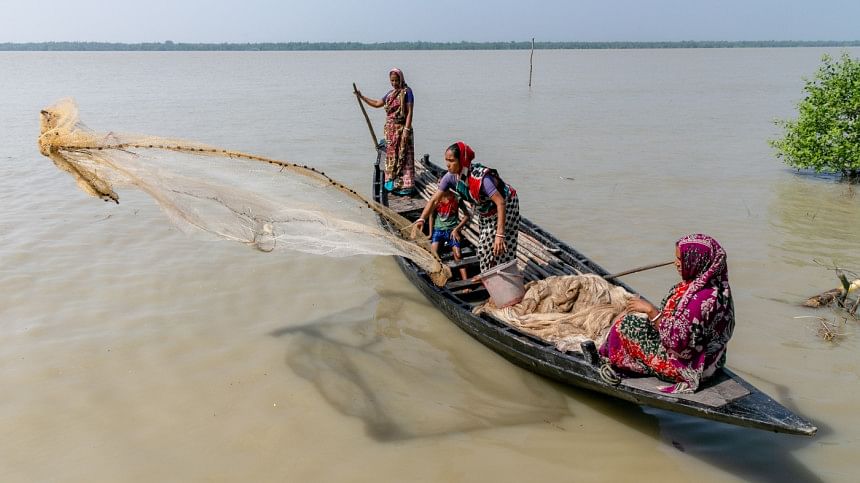Progress null if we fail rural women

My work as a women's rights activist has taken me across Bangladesh to some of its remotest and rural parts. Witnessing the struggles of women in these regions led a group of us to establish Badabon Sangho in 2016, with the intention of empowering vulnerable female landowners, fisherfolk, and farmers along the coastal belt. In the last 20 years. I have witnessed progress in some areas, but for a lot of these communities, I find that the situation remains largely the same.
Yes, we have been able to mobilise more women to assert their rights and engage with their local government. We do see stronger leadership among women who are raising their voices against discrimination. There are more female representatives on different committees of local government to build women's leadership. I'm so proud of our young activists opposing child marriage who have also formed their own football team, against all odds. But these numbers are small and not enough. I know change takes time and we must celebrate our progress, but I can't help but feel impatient about this slow rate of change, especially when some of the basic problems still remain. I still meet countless women being deprived of their right to inherit land by their own family members and land grabbers. Child marriage, trafficking, and violence against women and girls persist. I still find women with no decision-making power, who are completely dependent on their husbands or fathers. I still meet men who view women's labour as "helping the family" rather than contributing to the economy.
Before working in the coastal belt area, I had no knowledge about fisherfolk women or their immense contribution to the food supply chain. This community of women in the Sundarban area spends around 12-14 hours a day in the water, catching fish and processing them to sell in the market. Ironically, their contribution is not recognised because it is still socially unacceptable to label women as fisherfolk. They might be doing hard labour and earning for their family, but aren't granted the title of fisherfolk. Not getting recognition means not getting fisherfolk cards, not getting the card means not receiving the social safety net benefits they are entitled to. It is noteworthy that government guidelines in 2019 do not discriminate between genders and dictate that all women fisherfolk should receive the fisherfolk social safety cards. So the policy exists, but its implementation remains unrealised because of patriarchal ideas around women's work.
I often think of Amina (one of the group members of Badabon Sangho) who said, "I work on my own family land without pay." Although the contribution of women in the agriculture sector is huge, they still do not have sufficient access to the market or to money, and decision-making powers are still held by husbands, brothers, and in-laws. A glaring gap in knowledge about inheritance laws makes it so that many women don't claim their rights. Additionally, being raised in a patriarchal society socialises women to have low self-esteem, and so they are emotionally manipulated to give up control of the land they own and stay dependent on the men in their lives. Interestingly, issues of climate change and persisting poverty are pushing more men to migrate to urban areas for job opportunities and the participation of men in the agriculture sector has diminished by over 10 percent in the last decade. This void has been filled by female workers, but with little change to their existing situation.
These problems have existed for decades, across generations and communities, and even when progress is made, it is often undone with worsening climate change. Though the communities in Bangladesh's coastal belt have faced the wrath of Mother Nature their whole lives, an increase in salinity, rising sea levels, unpredictable weather, and natural disasters are destroying livelihoods and homes at a rate that we cannot imagine. We are witnessing the suffering of families with young children who have had to shift homes over 12-14 times. We are encountering large numbers of women who are suffering from various new health and reproductive issues which further impact their social standing.
I wonder if readers are as tired of learning about the dire situation of rural women as I am. And if we are, then imagine how tired they must feel. International Women's Day is meant to inspire solidarity to realise the rights of all women, so we cannot ignore the struggles of women in agriculture. They are huge contributors to our economy and providers of the fish and vegetables we love, but they still remain unaware of their equal rights. Without them, we are far poorer. Let us not falter in our commitment to uplift these women, to amplify their voices, and to ensure their rights are realised.
Lipi Rahman is executive director of Badabon Sangho.
Views expressed in this article are the author's own.
Follow The Daily Star Opinion on Facebook for the latest opinions, commentaries and analyses by experts and professionals. To contribute your article or letter to The Daily Star Opinion, see our guidelines for submission.


 For all latest news, follow The Daily Star's Google News channel.
For all latest news, follow The Daily Star's Google News channel. 











Comments